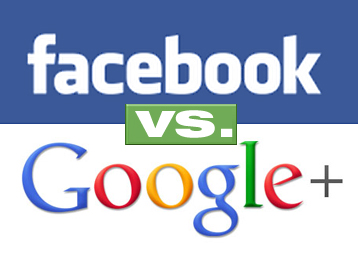I read a post this week about why “Facebook is doomed” based a high level view of the combined innovation and multi-channel growth strategy of Google. The post is a bit like comparing a Navy aircraft carrier to a luxury yacht, since Google’s social network is G+, not Google as an entirety. While I agree on the whole that Google is a stronger company, I believe Facebook offers healthy duration of value for both users and investors.
Not everyone wants to rank higher in Google search
As a marketer, this concept was, at first, quite foreign to me. But after speaking with everyday people who are neither entrepreneurs nor corporate marketers – I understand their desire for what they perceive to be a level of privacy. Ranking higher in G+ or Google search has never been, and will never be, a priority for a relatively large group of people.
With so many products and services rushing to the G+ platform to gain search rank, it actually serves as a ‘turn-off’ for people who want online relationships that are about caring more than ranking. People have learned to ignore Facebook ads as a whole, yet seem to enjoy discovering and promoting products and services that mean something to them.
Not everyone wants to expose their collective content to the multi-tiered monopoly of Google infrastructure
Whether you think Google applications are the best, or you don’t even know about them, most people understand that Google has the lion’s share of access to Internet content. When I hear teen-agers discussing how they don’t want Google in their “biz” (although they have no problem with Microsoft cloud), I realize that Google has brand issues that remain unaddressed.
Additionally, as Google expands its control of information and data across various products and services, more international government regulators are going to step up against the somewhat obvious monopoly. Google will either be forced to share the data with government entities, or regulatory scrutiny will, in turn, lead to the eventual splitting of Google into separate companies whereby data transfer may or may not be allowed.
Facebook has generations of friends and family from very young to very senior ages using its platform to communicate and play games together
Marketers understand that once you have achieved generational marketing, you’re in for the long haul. While Google has achieved this with Search and YouTube, its other endeavors are still playing catch-up. Facebook is a family- and friends-based communications platform. Most mom’s will allow their kids on Facebook, helping to set their privacy settings – but would feel threatened to place the same child onto the network of Google+. This is due to:
- A communications shortcoming by G+ whereby mom has a lack of understanding of the functional behaviors of Google+,
- Lack of family-centric branding and design by G+,
- The entire family being on Facebook – how and why would you get them to migrate?
Facebook has been embraced by school districts and town champions
From ‘Friday Night Lights’ to town-wide garage sales, Facebook has an edge over Google local! Not in Search… but in relationships and social sharing. Facebook’s content among friends allows people to stumble across things and information they need, but didn’t necessarily search for yet. Where relationships exist, the capacity exists to discuss and exchange knowledge and resources. The sheer volume of family and friends participating with local connectivity bubbles relevant content to the surface on Facebook that doesn’t happen on G+. Also, Google’s local Search doesn’t give the emotional context of relationships that add weight to local decision-making.

